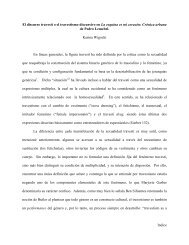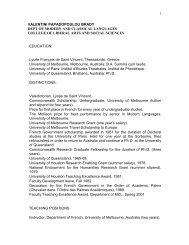Revenge, Justice, and the Law
Revenge, Justice, and the Law
Revenge, Justice, and the Law
Create successful ePaper yourself
Turn your PDF publications into a flip-book with our unique Google optimized e-Paper software.
30 THE WAYNE LAW REVIEW [Vol. 50:4<br />
Yet, even <strong>the</strong> New Testament, I would submit, does not condemn<br />
revenge, per se, for after all, its admonition is only that mortals should not<br />
exact revenge. God, it is clear, will continue to avenge, <strong>and</strong> thus “repay” <strong>the</strong><br />
wrong doer. Thus <strong>the</strong> idea of repayment <strong>and</strong> deserts is not forbidden, it is<br />
only reserved for God, alone. 113 I would fur<strong>the</strong>r submit that in this way,<br />
Romans 12:19 merely echoes <strong>the</strong> concerns of those civilizations which<br />
predated Christianity; that victims, unregulated in <strong>the</strong>ir quest for revenge,<br />
were ill suited to be dispensers of justice. 114<br />
It was not until <strong>the</strong> Post-Enlightenment Period, 115 that <strong>the</strong> legitimacy of<br />
state imposed punishment required more than simply a claim to be acting as<br />
God’s agent. Instead, <strong>the</strong> secular concepts of proportionality of punishment,<br />
<strong>and</strong> individual, ra<strong>the</strong>r than collective responsibility for criminal acts, arose<br />
as <strong>the</strong> basic concepts of criminal law. 116 Underlying <strong>the</strong>se changes was a<br />
shift away from viewing <strong>the</strong> criminal justice system as a vehicle for<br />
enforcing religion- based morality, replacing it with <strong>the</strong> belief that <strong>the</strong><br />
criminal law should operate to fur<strong>the</strong>r <strong>the</strong> good of a more secular society.<br />
These beliefs were exemplified by <strong>the</strong> writings of <strong>the</strong> 18th century<br />
philosopher, Cesare Beccaria, particularly his work entitled Essay on<br />
Crimes <strong>and</strong> Punishment. 117 Beccaria, a member of <strong>the</strong> Enlightenment,<br />
believed in <strong>the</strong> social contract <strong>the</strong>ory of society, under which citizens agreed<br />
to forego certain individual liberties <strong>and</strong> rights, in exchange for <strong>the</strong><br />
government’s promise to act on <strong>the</strong>ir behalf to safeguard <strong>the</strong>ir lives <strong>and</strong> well<br />
being. 118 Becarria also challenged <strong>the</strong> notion that <strong>the</strong> criminal law was an<br />
113. See MURPHY, supra note 79, at 88.<br />
114. However, if by equating revenge with sin, <strong>the</strong> goal was to eradicate revenge, one<br />
can only conclude that <strong>the</strong> attempt was not very successful. Indeed, as Jacoby notes, what<br />
may in fact be <strong>the</strong> longest revenge cycle in history, <strong>the</strong> persecution of <strong>the</strong> Jews for <strong>the</strong><br />
crucifixion of Jesus, remained a fixed <strong>and</strong> countenanced policy of <strong>the</strong> Church for almost 2000<br />
years. JACOBY, supra note 11, at 68. Fur<strong>the</strong>rmore, having religion as <strong>the</strong> justification for<br />
imposing criminal punishment, led to a system of proportionality that based punishment<br />
upon <strong>the</strong> level of deviance from <strong>the</strong> teachings of <strong>the</strong> Church, ra<strong>the</strong>r than upon <strong>the</strong> level of<br />
harm. McDonald, supra note 20, at 655.<br />
115. The Enlightenment was an 18th century philosophical movement characterized by<br />
rationalism, skepticism, <strong>and</strong> empiricism in social <strong>and</strong> political thought. WEBSTER’S, supra<br />
note 29, at 482.<br />
116. JACOBY, supra note 11, at 139.<br />
117. CESARE BECCARRIA, ESSAY ON CRIMES AND PUNISHMENTS (Edward D.<br />
Ingraham trans., 1819) (1764).<br />
118. Id. at 20.











